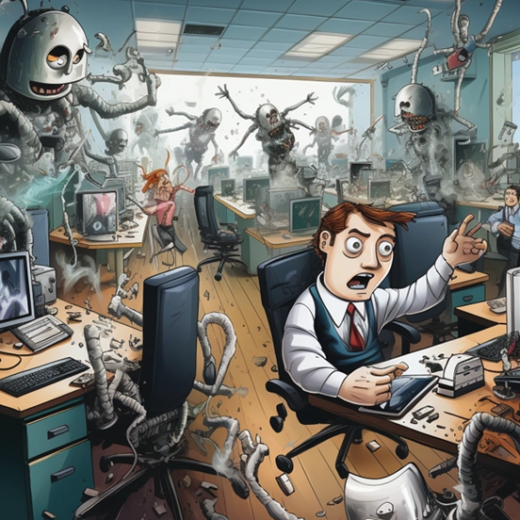
The post Covid-19 future of healthcare: Part one
In the first of our two-part special, Rachel Dunscombe, CEO of the NHS Digital Academy and KLAS Arch collaborative UK lead, shares her thoughts on the big questions facing healthcare post Covid-19, including the lasting cultural and technology changes, future funding, possible new healthcare models and why existing roles and responsibilities will be challenged. Will […]
In the first of our two-part special, Rachel Dunscombe, CEO of the NHS Digital Academy and KLAS Arch collaborative UK lead, shares her thoughts on the big questions facing healthcare post Covid-19, including the lasting cultural and technology changes, future funding, possible new healthcare models and why existing roles and responsibilities will be challenged.
Will Covid-19 change the NHS and wider healthcare environment for good or will it be business as usual once ‘normality’ returns?
Meaningful change must happen for several reasons. Firstly, there’s going to be a gentle push from citizens, who will expect the new normal driven by coronavirus – people with long term conditions now being seen at home, for example – to continue. Secondly, clinicians and those working in the health service have seen up close the art of the possible, so their frame of reference, and language, have changed. And thirdly, coronavirus has vastly improved digital literacy and acceptance, because the population has been forced to come to terms with technology.
RCGP chair Professor Martin Marshall estimated that as many as 93% of GP consultations are being carried out virtually at the moment – with up to half likely to be carried out remotely after the crisis. Hospitals are using video consultation technology to hold hundreds of remote consultations every week. This means, in my opinion, we can’t go backwards.
Part of the need to progress is to embed knowledge, language and ways of working into society. Even if there are things that we’ve done during this period, which haven’t been good, they can act as an articulation of what we should do meaning we won’t return to analogue.
Will healthcare receive the funding it needs for true transformation?
I would say that all political parties have chosen not to fully invest in healthcare over the last few decades. A recent NAO report says that investment in digital transformation has been insufficient to deliver the national transformation ambitions. The government committed £4.7 billion to deliver the Portfolio between 2016-17 and 2020-21. This was an increase on expenditure in prior years, but an independent review considered it to be insufficient to fully deliver the ambitions. At a local level, trusts’ expenditure on IT varies widely and collectively they spend less than the recommended level: NHSE&I estimates that less than 2% of trusts’ expenditure is on technology, compared with a recommended 5% by the NAO and a previous recommendation restated several times since 2004 of 4% by Wanless.
But what shouldn’t be lost in the current situation is that good healthcare is the backbone of a happy, healthy and prosperous society. Plus, there are huge numbers of businesses and opportunities that fit in and around a good healthcare system, like life sciences, research, education and biotech start-ups. Healthcare brings a lot more than just the health and wellness of the population. It can also be used to create economic benefit.
As a result, I think there will be a reframing of how we look at investment. If we look at the way CCGs commission services, solutions and providers, it is still not aligned across the healthcare system. Our capital funding, and the way that we use that for technology, and how to buy assets, rather than services such as cloud, is most definitely not aligned. The positive point of view is that we’ve now got enough articulation of what the problem may be, because of Covid-19, and we’ve definitely become more familiar with the changes that need to happen going forward.
Can health and social care really become one system to realise new healthcare models?
This is crucial. Social care, public health etc. reside mainly in local government at this point, so they are very much part of where we need to be – as one.
Public health plays a huge role in figuring out which route we need to take to even out inequalities. We also need to make sure that we’ve got our third sector completely and utterly lined up to work with us. There is such an amazing skill set amongst wonderfully fleet of foot people in the third sector who have a deep understanding of conditions and people, who we really need to act as part of the system equilibrium. Only when we’re working together as one will we truly redesign services for the needs of citizens who actually receive those services.
You mentioned data there – how do we get all these organisations working together and effectively sharing data? And will data ethics become the next big roadblock to change?
The issue we have today is that we don’t have clean, standardised, and when needed, codified data in real time. We collect in spurious formats and we can’t necessarily interoperate fully. We therefore need to look at system architecture to overcome the challenge. There are also some relatively neglected sources of data that could prove useful and maybe should be resurfaced, such as workforce login data from the NHS Spine (which could give a view on workforce absence), data on diagnosis trends from GPs and eDischarge data passing through the MESH service.
The data privacy issue is one that we should consider – but I’m seeing the narrative shift. Rather than people questioning ‘why are using my data for care’, they’re now asking ‘why haven’t you got my data for care’? The sense of why one NHS body can’t pass data to another one and why somebody must give more blood or have another CT scan or explain their history over and over again baffles people.
While we will have to elegantly work our way through the data sharing narrative and be fully transparent, a failure to share data because we don’t know how to put all of the pieces in place is unacceptable – at some point, somebody will say, ‘deaths happened because data wasn’t shared’. The combination of expectation from citizens, a want to deliver really safe care from clinical and professional staff, and probably some of the learnings from Covid-19 will allow us to see that that data must be available, wherever care is delivered.
I contributed to a letter in the BMJ recently that mentioned the need for progress to be made on how we disseminate information, which is vital. As was said in that piece, it is disappointing that we are still operating treatment in the form of fixed linear non personalised pathways. 96% of GP practices were computerised by 1996, and in 2019 three quarters of hospitals finally had an EHR in place. By this point should we not be able to deploy updated computerised clinical decision support, personalised pathways at scale using open standards?
Should we expect roles and how they are carried out to be challenged?
The answer is yes, but I wouldn’t necessarily use the word challenge. We don’t always put the right person in the right place at the right time. And we don’t have enough of some of the right people either. To coin Bob Wachter, the prominent academic physician, we need to reimagine what we do, taking in our enablers – things that un-constrain us like technology and skills – and actually redesign our services with different skill mixes and different modes of delivery.
We send multiple professionals into the home of any one individual, where maybe one professional could go in, provide assessments on behalf of others and have a video window to allow them to gain support of other senior clinicians by making them “virtually present”. We need to be more creative about how we put care around individuals and what that will mean for the future.
My conclusion is that it will mean a more varied working week for many professionals, because we will be delivering more personalised, precise care, giving people what they need, tailored around circumstance and focused on independence and self-management. We need what I call a more diffused set of care models, which consider circumstances and measure what can be delivered in or near the home, or virtually. Above all else, we need to redesign our services so that every pound of every working hour is put in the appropriate place. That’s going to take data, communication and all the good things that digital provides.





